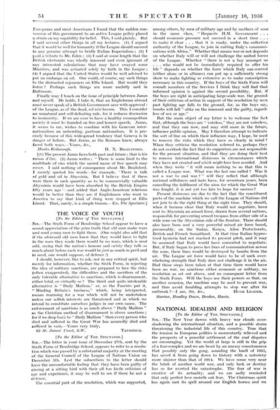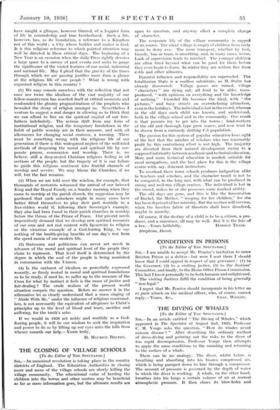NATIONAL IDEALISM AND RELIGION
[To the Editor of THE SPECTATOR.]
SIR,—The New Year dawns with heavy war clouds over- shadowing the international situation, and a possible storm threatening the industrial life of this country. True that the tension in European politics is momentarily relieved and the prospects of a peaceful settlement of the coal disputes are encouraging. Yet the world at large is still in the grip of a fear-complex and we are beset by an uneasy consciousness that possibly only the gong, sounding the knell of 1935, has saved it from going down to history with a notoriety more sinister than that of 1914. We have come very near the brink of another world war, and only luck or destiny has so far averted the catastrophe. The fear of war is creative of its actuality, and we are sadly reminded that only perfect love casteth out fear. The Christmas spirit has again cast its spell around- our English homes and we have caught a glimpse, however blurred, of a happier form of life in comradeship and true brotherhood. Such a life, however, has, as its foundation, a reference to a Kingdom not of this world ; a City whose builder and maker is God. It is this religious reference to which pointed attention may well be directed in these critical days. The beginning of a New Year is an occasion when the daily Press rightly devotes a large space to a survey of past events and seeks to gauge the significance of the varied features of our social, industrial and national life. May I plead that the gravity of the times through which we are passing justifies more than a glance at the religious life of our people ? What is wrong with organised religion in this country ?
(1) We may console ourselves with the reflection that not once nor twice the idealism of the vast majority of our fellow-countrymen has asserted itself at critical moments and confounded the gloomy prognostications of the prophets who bewailed the decay of religion amongst us. Nevertheless I venture to suggest a real danger in allowing us to think that we can afford to live on the spiritual capital of our fore- fathers indefinitely. The serious drift from any form of institutional religion, and the temporary breakdown in the habit of public worship are in their measure, and with all allowances for changing social customs, a warning. There must be something wrong with the religious life of our generation if there is this widespread neglect of the well-tried methods of deepening the moral and spiritual life by cor- porate prayer, communion and worship. There is, we believe, still a deep-seated Christian religious feeling in all sections of the people, but the tragedy of it is our failure to guide this religious sentiment into fruitful channels of worship and service. We may blame the Churches, if we will, but the fact remains.
(2) When we are told over the wireless, for example, that thousands of motorists witnessed the arrival of our beloved King and the Royal Family. on a Sunday morning when they came to worship at the parish church, the suggestion may be pardoned that such onlookers might in many cases have better fitted themselves to play their part worthily in a fear-ridden world if, following their Sovereign's example, they also had been found in their parish churches in worship before the throne of the Prince of Peace. Our present needs imperatively demand that we develop new spiritual resources of our own and not rest content with lip-service to religion or the vicarious example of a God-fearing King, to say nothing of the health-giving benefits of one day's rest from the speed mania of our modern life.
(3) Statesmen and politicians can never act much in advance of the moral and spiritual level of the people they claim to represent. That level itself is determined by the degree in which the soul of the people is being nourished in communion with the Unseen.
(4) Is the outburst of idealism so powerfully expressed recently, so firmly rooted in moral and spiritual foundations as to be ready, if need be, to suffer up to the measure of the Cross for what by instinct it feels is the cause of justice and fair-dealing ? The crude realism of the present world situation compels the question. Before we answer it in the affirmative let us clearly understand that a mass singing of " Abide With Me," under the influence of religious emotional- ism, is not necessarily the equivalent of allegiance to Christ's principles up to the level of blood and tears, sacrifice and suffering, for the truth's sake.
If we would in 1936 act nobly and worthily as a God- fearing people, it will be our wisdom to seek the inspiration and power to do so by lifting up our eyes unto the hills from whence cometh our help.—Yours truly,
IL MAURICE RELTON.











































 Previous page
Previous page